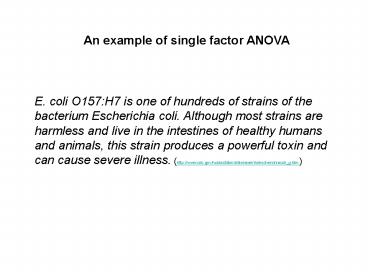An example of single factor ANOVA - PowerPoint PPT Presentation
1 / 13
Title:
An example of single factor ANOVA
Description:
... picks a number at random between 0 and 4 (using a random number generator) ... the same strategy to count the number of surviving cultures or colonies on ... – PowerPoint PPT presentation
Number of Views:115
Avg rating:3.0/5.0
Title: An example of single factor ANOVA
1
An example of single factor ANOVA
E. coli O157H7 is one of hundreds of strains of
the bacterium Escherichia coli. Although most
strains are harmless and live in the intestines
of healthy humans and animals, this strain
produces a powerful toxin and can cause severe
illness. (http//www.cdc.gov/ncidod/dbmd/diseasein
fo/escherichiacoli_g.htm)
2
An example of single factor ANOVA
Suppose that a researcher is interested in
comparing the ability of 5 different kinds of
antibiotics to eliminate E. coli O157H7. These
antibiotics are Amikacin, Gentamicin, Kanamycin,
Neomycin, and Streptomycin. The researcher sets
up an experiment in which 50 agar-plates are
prepared with the same concentration of nutrients
mixed with the same concentration of antibiotics
for each plate. To eliminate the effect of
experience in preparing these plates the
researcher picks a number at random between 0 and
4 (using a random number generator)
3
An example of single factor ANOVA
The researcher, then, inoculates each plate with
1mL from 50, 1L, flasks that are previously
prepared and continuously shacked to maintain the
homogeneity of the E. coli O157H7 within. This
inoculation process was also randomized as
described for the plate preparation procedure.
4
An example of single factor ANOVA
The plates were left in the lab over night and
were randomly chosen, one at a time, using the
same strategy to count the number of surviving
cultures or colonies on each of them. This count
was used to study the effect of the different
antibiotics on E. coli O157H7 The following
table shows these counts.
5
Counts of antibiotic resistant colonies
This data is made up and cant be used for any
purpose other than explaining the concepts of
experimental design.
6
Exploratory analysis
Hypotheses
Linear Model
7
Exploratory analysis
Step1 have a look at your data!
Step2 Have even a closer look, check the
adequacy of the model.
1) Normality of the residuals, and hence the
Yijs (qq-plots).
2) Homogeneity of the variance and outliers
(BF-test, standardized-residual plots against
predicted values).
Step3 Transform (to stabilize the variance and
adjust for the violation of normality
assumption?).
1) What kind of transformation (regression
analysis,if you have enough data, or just a look
at the data and try)?
Remember that the analysis is on the transformed
data!
8
Exploratory analysis
Step1 have a look at your data again!
Step2 Have even a closer look, check the
adequacy of the model again.
1) Normality of the residuals, and hence the
Yijs (qq-plots).
2) Homogeneity of the variance and outliers
(BF-test, standardized-residual plots against
predicted values).
3) Independence of the observations
(standardized-residual plots against time of
processing).
3) Other candidate variables (standardized-residua
l plots against other variables).
Step3 Transform again? (to stabilize the
variance and adjust for the violation of
normality assumption).
Remember that the analysis is on the transformed
data!
9
Exploratory analysis
Step4 Estimates of summary statistics.
Step5 Conduct the ANOVA
Step6 Make a decision!
1) Calculate the test statistic.
2) Use either the p-value or the critical value
to test.
10
Exploratory analysis
Step 7 Data snooping
1) Specific contrasts (all of them, Scheffe)?
11
Exploratory analysis
Step 7 Data snooping (Cont.)
2) All pair-wise differences (Tukeys)?
12
Exploratory analysis
Step 7 Data snooping (Cont.)
3) Assuming the first treatment level was a
Control, compare against a control (Dunnett)?
13
Confirmatory data analysis
Pre-specified orthogonal hypotheses































